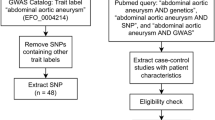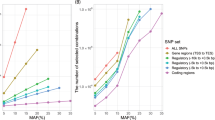Abstract
Several genes have been implicated in the etiology of ankylosing spondylitis (AS); however, the significance of these genes except HLA-B27 remains to be elucidated. In this study, we examined the association of AS with novel candidate genes and previously reported genes other than HLA-B27. We examined a total of 45 single nucleotide polymorphisms (SNPs) in 15 genes by a sequential screening. We first genotyped 170 Japanese AS patients and 896 controls for the SNPs (first screen). Then, we genotyped eight SNPs with P < 0.05 in the first screen for 108 additional Japanese patients (second screen). We checked the replication of the association of the most significant SNP by genotyping 219 Taiwanese AS patients and 185 controls. When the first and second screens were combined, four SNPs showed nominal significance of P < 0.05. An intronic SNP (IVS1 + 996G > A) in MSX2, a novel candidate gene, showed the most significant association (P = 0.0030). The association was not replicated in our Taiwanese population; however, there was the same trend with the Japanese population in the allelic frequency distribution of the SNP. In the genes previously reported to have association with AS, only one synonymous SNP, c.963T > G in ANKH, showed a marginal association in the Japanese population (P = 0.045).
Similar content being viewed by others
Log in or create a free account to read this content
Gain free access to this article, as well as selected content from this journal and more on nature.com
or
References
Beyeler C, Armstrong M, Bird HA, Idle JR, Daly AK (1996) Relationship between genotype for the cytochrome P450 CYP2D6 and susceptibility to ankylosing spondylitis and rheumatoid arthritis. Ann Rheum Dis 55:66–68
Brewerton DA, Hart FD, Nicholls A, Caffrey M, James DC, Sturrock RD (1973) Ankylosing spondylitis and HL-A 27. Lancet 1:904–907
Brown MA, Kennedy LG, MacGregor AJ, Darke C, Duncan E, Shatford JL, Taylor A, Calin A, Wordsworth P (1997) Susceptibility to ankylosing spondylitis in twins: the role of genes, HLA, and the environment. Arthritis Rheum 40:1823–1828
Brown MA, Wordsworth BP, Reveille JD (2002) Genetic of ankylosing spondylitis. Clin Exp Rheumatol 20:S43–S49
Calin A (1998) Anklosing spondylitis. In: Maddison PJ, Isenberg DA, Woo P, Glass DN (eds) Oxford textbook of rheumatology, vol 2. Oxford University Press, Oxford, pp 1058–1070
Calin A, Marder A, Becks E, Burns T (1983) Genetics differences between B27 positive patients with ankylosing spondylitis and B27 positive healthy controls. Arthritis Rheum 26:1460–1464
Goedecke V, Crane AM, Jaakkola E, Kaluza W, Laiho K, Weeks DE, Wilson J, Kauppi M, Kaarela K, Tuomilehto J, Wordsworth BP, Brown MA (2003) Interleukin 10 polymorphisms in ankylosing spondylitis. Genes Immun 4:74–76
Haga H, Yamada R, Ohnishi Y, Nakamura Y, Tanaka T (2002) Gene-based SNP discovery as part of the Japanese Millennium Genome Project: identification of 190,562 genetic variations in the human genome. Single-nucleotide polymorphism. J Hum Genet 47:605–610
Ho AM, Johnson MD, Kingsley DM (2000) Role of the mouse ank gene in control of tissue calcification and arthritis. Science 289:265–270
Ikegawa S (2006) Tiptoe walking (ttw) mouse. In: Yonenobu K, Nakamura K, Toyama Y (eds) OPLL (ossification of the posterior longitudinal ligament), 2nd edn. Springer, Tokyo, pp 71–75
Jabs EW, Müller U, Li X, Ma L, Luo W, Haworth IS, Klisak I, Sparkes R, Warman ML, Mulliken JB, Snead ML, Maxson R (1993) A mutation in the homeodomain of the human MSX2 gene in a family affected with autosomal dominant craniosynostosis. Cell 75:443–450
Kizawa H, Kou I, Iida A, Sudo A, Miyamoto Y, Fukuda A, Mabuchi A, Kotani A, Kawakami A, Yamamoto S, Uchida A, Nakamura K, Notoya K, Nakamura Y, Ikegawa S (2005) An aspartic acid repeat polymorphism in asporin inhibits chondrogenesis and increases susceptibility to osteoarthritis. Nat Genet 37:138–144
Liu YH, Tang Z, Kundu RK, Wu L, Luo W, Zhu D, Sangiorgi F, Snead ML, Maxson RE (1999) Msx2 gene dosage influences the number of proliferative osteogenic cells in growth centers of the developing murine skull: a possible mechanism for MSX2-mediated craniosynostosis in humans. Dev Biol 205:260–274
Ma L, Golden S, Wu L, Maxson R (1996) The molecular basis of Boston-type craniosynoptosis: the Pro148His mutation in the N-terminal arm of the MSX2 homeodomain stabilizes DNA binding without altering nucleotide sequence preferences. Hum Mol Genet 5:1915–1920
Maksymowych WP, Rahman P, Reeve JP, Gladman DD, Peddle L, Inman RD (2006) Association of the IL1 gene cluster with susceptibility to ankylosing spondylitis: an analysis of three Canadian populations. Arthritis Rheum 54:974–985
Mori K, Chano T, Ikeda T, Ikegawa S, Matsusue Y, Okabe H, Saeki Y (2003) Decrease in serum nucleotide pyrophosphatase activity in ankylosing spondylitis. Rheumatology 42:62–65
Newberry EP, Boudreaux JM, Towler DA (1997) Stimulus-selective inhibition of rat osteocalcin promoter induction and protein-DNA interactions by the homeodomain repressor Msx2. J Biol Chem 272:29607–29613
Ohnishi Y, Tanaka T, Ozaki K, Yamada R, Suzuki H, Nakamura Y (2001) A high-throughput SNP typing system for genome-wide association studies. J Hum Genet 46:471–477
Okawa A, Nakamura I, S Goto, Moriya H, Nakamura Y, Ikegawa S (1998) Mutation in Npps in a mouse model of ossification of the posterior longitudinal ligament of the spine. Nat Genet 19:271–273
Rubin LA, Amos CI, Wade JA, MartinJR, Bale SJ, Little AH, Gladman DD, Bonney GE, Rubenstein JD, Siminovitch KA (1994) Investigating the genetic basis for ankylosing spondylitis: linkage studies with the major histocompatibility complex region. Arthritis Rheum 37:1212–1220
Satokata I, Ma L, Ohshima H, Bei M, Woo I, Nishizawa K, Maeda T, Takano Y, Uchiyama M, Heaney S, Peters H, Tang Z, Maxson R, Maas R (2000) Msx2 deficiency in mice causes pleiotropic defects in bone growth and ectodermal organ formation. Nat Genet 24:391–395
Shao JS, Cheng SL, Pingsterhaus JM, Charlton-Kachigian N, Loewy AP, Towler DA (2005) Msx2 promotes cardiovascular calcification by activating paracrine Wnt signals. J Clin Invest 115:1210–1220
Shirakabe K, Terasawa K, Miyama K, Shibuya H, Nishida E (2001) Regulation of the transcription factor Runx2 by two homeobox proteins, Msx2 and Dlx5. Genes Cells 6:851–856
Suzuki A, Yamada R, Chang X, Tokuhiro S, Sawada T, Suzuki M, Nagasaki M, Nakayama-Hamada M, Kawaida R, Ono M, Ohtsuki M, Furukawa H, Yoshino S, Yukioka M, Tohma S, Matsubara T, Wakitani S, Teshima R, Nishioka Y, Sekine A, Iida A, Takahashi A, Tsunoda T, Nakamura Y, Yamamoto K (2003) Functional haplotypes of PADI4, encoding citrullinating enzyme peptidylarginine deiminase 4, are associated with rheumatoid arthritis. Nat Genet 34:395–402
Timms AE, Zhang Y, Bradbury L, Wordsworth BP, Brown MA (2003) Investigation of the role of ANKH in ankylosing spondylitis. Arthritis Rheum 48:2898–2902
Tsui FWL, Tsui HW, Cheng EY, Stone M, Payne U, Reveille JD, Shulman MJ, Paterson AD, Inman RD (2003) Novel genetic markers in the 5′-flanking region of ANKH are associated with ankylosing spondylitis. Arthritis Rheum 48:791–797
van der Linden S, Valkenburg HA, Cats A (1984) Evaluation of diagnostic criteria for ankylosing spondylitis. A proposal for modification of the New York criteria. Arthritis Rheum 27:361–368
van der Paardt M, Crusius JB, Garcia-Gonzalez MA, Baudoin P, Kostense PJ, Alizadeh BZ, Dijkmans BA, Pena AS, van der Horst-Bruinsma IE (2002) Interleukin-1beta and interleukin-1 receptor antagonist gene polymorphisms in ankylosing spondylitis. Rheumatology 41:1419–1423
Wilkie AOM, Tang Z, Elanko N, Walsh S, Twigg SRF, Hurst JA, Wall SA, Chrzanowska KH, Maxson RE (2000) Functional haploinsufficiency of the human homeobox gene MSX2 causes defects in skull ossification. Nat Genet 24:387–390
Yen JH, Tsai WC, Chen CJ, Lin CH, Ou TT, Hu CJ, Liu HW (2003) Cytochrome P450 1A1 and manganese superoxide dismutase genes polymorphisms in ankylosing spondylitis. Immunol Lett 88:113–116
Yoshizawa T, Takizawa F, Iizawa F, Ishibashi O, Kawashima H, Matsuda A, Endo N, Kawashima H (2004) Homeobox protein Msx2 Acts as a molecular defense mechanism for preventing ossification in ligament fibroblasts. Mol Cell Biol 24:3460–3472
Acknowledgments
We thank individuals for participating the study. We also thank Dr. N. Tsuchiya for help in collecting samples and critical advice, and Dr. S. Tominaga, Mr. Yung-Feng Lin, and Ms. Ting-Chun Liu for technical assistance.
Author information
Authors and Affiliations
Corresponding author
Additional information
Tatsuya Furuich and Koichi Maeda contributed equally to this work.
Rights and permissions
About this article
Cite this article
Furuichi, T., Maeda, K., Chou, CT. et al. Association of the MSX2 gene polymorphisms with ankylosing spondylitis in Japanese. J Hum Genet 53, 419–424 (2008). https://doi.org/10.1007/s10038-008-0265-3
Received:
Accepted:
Published:
Issue date:
DOI: https://doi.org/10.1007/s10038-008-0265-3
Keywords
This article is cited by
-
Expression of VEGFA-mRNA in classical and MSX2-mRNA in non-classical monocytes in patients with spondyloarthritis is associated with peripheral arthritis
Scientific Reports (2021)
-
Recent studies on the genetic basis of ankylosing spondylitis
Current Rheumatology Reports (2009)



